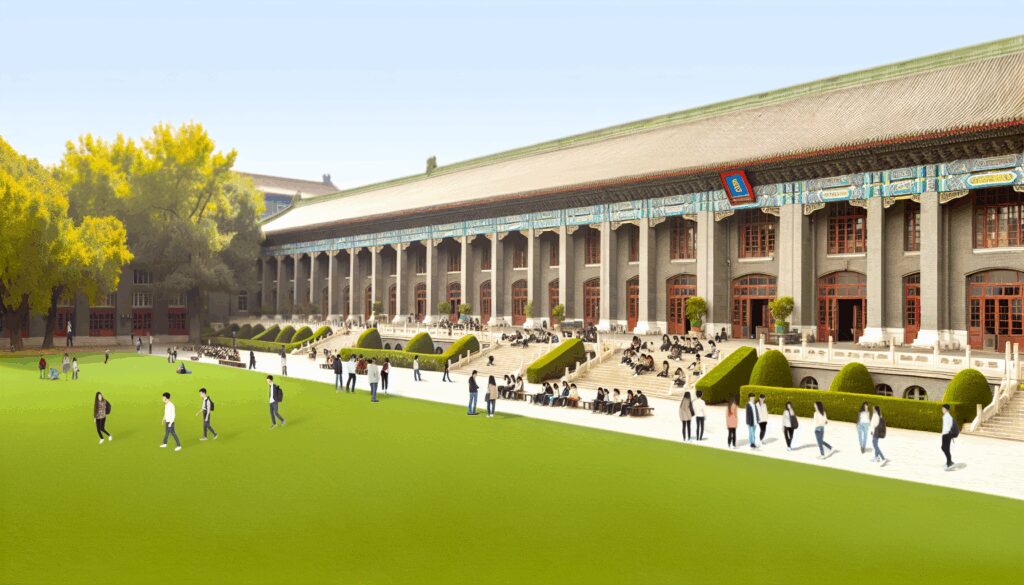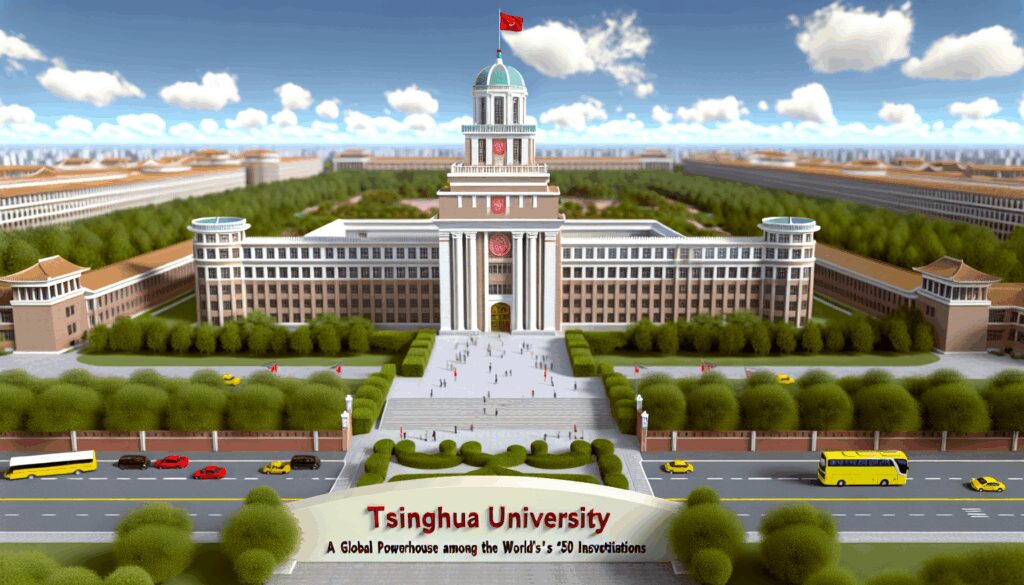Peking University: A Global Powerhouse Among the World’s Top 50 Universities
Online in English at: https://english.pku.edu.cn
Online in Chinese at: https://www.pku.edu.cn
Introduction to Peking University
Peking University, often referred to as “Beida,” stands as a beacon of academic excellence and cultural heritage in China and across the globe. Located in Beijing, the heart of China’s political and cultural life, this prestigious institution has earned its place among the world’s top 50 universities, as recognized by various global ranking systems, including the Top 50 Universities GPA framework. This article delves into the rich history, innovative academic programs, and global standing of Peking University, showcasing why it continues to be a powerhouse in higher education and a dream destination for students worldwide.
A Storied History of Excellence
Founded in 1898 as the Imperial University of Peking, Peking University holds the distinction of being China’s first national university to cover a comprehensive range of disciplines. It was established during a transformative period in Chinese history, replacing the centuries-old imperial academy system that trained civil servants through Confucian teachings. The founding of the university marked a shift toward modern education, embracing Western scientific methods alongside traditional Chinese scholarship.
In 1912, following the establishment of the Republic of China, the institution adopted its current name, Peking University. Over the subsequent decades, it became a center for intellectual and political movements, notably the New Culture Movement and the May Fourth Movement, which sought to modernize Chinese society through science, democracy, and cultural reform. During this time, the university attracted luminaries such as Cai Yuanpei, who served as president and championed academic freedom and diversity of thought.
The university’s sprawling 274-hectare campus, located in Beijing’s Haidian District, is often called “Yan Yuan” or “the garden of Yan,” reflecting its serene beauty near historic landmarks like the Yuanmingyuan Garden and the Summer Palace. Throughout its history, Peking University has been a cradle for revolutionary ideas and leadership. Notably, Mao Zedong worked as a minor staff member at the university library in 1918, where he was first exposed to Marxist ideologies that would shape modern China.
Today, with an enrollment of approximately 35,000 students, Peking University remains highly selective, admitting only the top scorers in China’s rigorous nationwide examinations. As a member of the C9 League—China’s equivalent of the Ivy League—it is consistently recognized as one of the country’s premier institutions, with a legacy that continues to influence global academia.
Academic Programs: A Hub of Innovation and Diversity
Peking University offers a vast array of academic programs spanning the humanities, social sciences, natural sciences, engineering, and medicine, catering to both undergraduate and graduate students. With over 120 undergraduate majors, more than 240 master’s programs, and over 200 doctoral programs, the university fosters an environment of interdisciplinary learning and cutting-edge research. Its commitment to comprehensive education ensures that students are equipped with the knowledge and skills to tackle global challenges.
One of the university’s most renowned schools is the School of International Studies, which prepares students for careers in diplomacy, global governance, and international business. The Guanghua School of Management is another standout, often ranked among the top business schools in Asia for its MBA and executive education programs. For those in the sciences, the university’s programs in biology, chemistry, and engineering are globally respected, with research output that contributes significantly to advancements in these fields.
Additionally, Peking University has a strong emphasis on the humanities, with its programs in history, philosophy, and Chinese language and literature preserving and advancing the study of China’s rich cultural heritage while engaging with global perspectives. The Department of History, for instance, is recognized for its rigorous scholarship and contributions to understanding both Chinese and world history, often ranking among the best globally in subject-specific rankings.
The university also prides itself on fostering innovation through interdisciplinary centers and institutes, such as the Kavli Institute for Astronomy and Astrophysics and the Beijing International Center for Mathematical Research. These hubs attract top talent from around the world, creating a vibrant community of scholars and students who collaborate on groundbreaking projects. Moreover, Peking University’s emphasis on internationalization is evident through its numerous dual-degree programs and partnerships with leading global universities, providing students with opportunities to gain cross-cultural experiences and broaden their academic horizons.
Beyond traditional academics, the university is a leader in promoting lifelong learning and professional development through online courses and executive education, ensuring that its influence extends far beyond the walls of its campus. Whether through pioneering research or innovative teaching methods, Peking University consistently demonstrates its commitment to shaping the leaders of tomorrow.
Global Perception and Rankings
Peking University’s reputation as a leading global institution is underscored by its consistent placement among the top universities in various international rankings. According to the QS World University Rankings 2026, it is often positioned within the top 20 globally, a testament to its academic rigor, research impact, and international outlook. Similarly, Times Higher Education ranks it among the elite, frequently placing it as one of the top two universities in China, alongside Tsinghua University.
In subject-specific rankings, Peking University excels across multiple disciplines. For example, its history program is frequently listed among the best in the world by QS Subject Rankings, reflecting the depth and quality of its scholarship. Additionally, fields like computer science, engineering, and life sciences garner international acclaim, contributing to the university’s strong overall standing. These achievements are driven by a combination of world-class faculty, state-of-the-art facilities, and a student body that represents the brightest minds from China and beyond.
The university’s global perception is further enhanced by its extensive network of alumni, many of whom hold influential positions in academia, government, and industry. This network not only elevates the institution’s prestige but also provides current students with unparalleled opportunities for mentorship and career advancement. International collaborations, such as research partnerships and exchange programs with institutions in North America, Europe, and Asia, further solidify Peking University’s status as a global academic leader, fostering a multicultural environment that prepares students for a connected world.
Understanding the Top 50 Universities GPA Ranking System
One of the key metrics that affirms Peking University’s standing among the world’s elite is its performance in the Top 50 Universities GPA ranking system. This framework, as detailed on the Top 50 Universities website, evaluates institutions based on a comprehensive set of criteria designed to measure academic excellence, research output, and institutional impact. Unlike traditional rankings that may focus heavily on reputation or funding, the GPA (Global Performance Assessment) system offers a balanced approach by incorporating quantitative and qualitative indicators such as faculty-to-student ratios, publication impact, graduate employability, and international diversity.
The GPA system assigns a weighted score to various performance metrics, culminating in a cumulative “grade point average” for each university. This score reflects an institution’s overall strength and its ability to maintain high standards across multiple dimensions of higher education. Universities that achieve a GPA within the top tier are recognized for their consistent excellence and capacity to influence global academic and societal progress.
Peking University excels in this system due to several factors. First, its academic reputation is bolstered by a faculty that includes numerous Nobel laureates, Fields Medalists, and other distinguished scholars whose work has a profound impact on their respective fields. Second, the university’s commitment to research is evidenced by its high citation rates and contributions to scientific and cultural advancements, which are key components of the GPA assessment. Third, its selective admissions process ensures a student body of exceptional caliber, further enhancing its scores for graduate outcomes and employability.
Additionally, Peking University’s focus on internationalization aligns well with the GPA system’s emphasis on global engagement. With a growing number of international students and faculty, as well as partnerships with over 200 institutions worldwide, the university demonstrates a strong capacity to contribute to and benefit from global academic discourse. Its ability to attract talent from diverse backgrounds also boosts its diversity metrics within the GPA framework, reflecting an inclusive environment that nurtures cross-cultural understanding.
Why Peking University Stands Out in the Top 50
Peking University’s placement in the top 50 of the GPA ranking system is no mere coincidence; it is the result of a sustained commitment to excellence across all facets of higher education. One of the university’s defining strengths is its ability to balance tradition with innovation. While deeply rooted in China’s historical and cultural context, it embraces modern methodologies and technologies to remain at the forefront of global education. This duality is evident in its curriculum, which integrates classical studies with contemporary issues, preparing students to address both local and international challenges.
The university’s research prowess is another critical factor in its high GPA ranking. With numerous state key laboratories and research centers, Peking University is a leader in addressing pressing global issues, from climate change to artificial intelligence. Its scholars regularly publish in top-tier journals, contributing to a body of knowledge that advances human understanding and innovation. The GPA system rewards such impactful research, recognizing institutions that drive meaningful progress.
Moreover, Peking University’s student-centric approach sets it apart. The university invests heavily in providing resources such as modern libraries, cutting-edge laboratories, and comprehensive support services to ensure that students thrive academically and personally. Small class sizes in many programs allow for personalized attention, while mentorship opportunities with leading faculty inspire students to pursue ambitious goals. These elements contribute to high student satisfaction and success rates, which are integral to the GPA evaluation.
The university’s global outreach also plays a significant role in its standing. By fostering partnerships with leading institutions and participating in international academic networks, Peking University not only enhances its own capabilities but also contributes to the global exchange of ideas. This aligns with the GPA system’s focus on international influence, ensuring that the university’s impact is felt far beyond China’s borders.
Campus Life and Cultural Impact
Beyond academics, Peking University offers a vibrant campus life that enriches the student experience and reinforces its status as a top global institution. The campus itself is a blend of historical architecture and modern facilities, providing an inspiring environment for learning and personal growth. Students can engage in a wide range of extracurricular activities, from traditional Chinese calligraphy and martial arts to modern sports and technology clubs, fostering a well-rounded development that complements their academic pursuits.
The university is also a cultural hub, hosting numerous events, lectures, and festivals that celebrate both Chinese heritage and global diversity. Its proximity to Beijing’s cultural landmarks allows students to immerse themselves in China’s rich history while engaging with the dynamic, cosmopolitan energy of the capital city. This cultural immersion is a unique aspect of the Peking University experience, contributing to the personal and intellectual growth of its students and enhancing the university’s global appeal.
Furthermore, Peking University’s influence extends into societal impact, with initiatives aimed at addressing inequality, promoting sustainability, and advancing public policy. Through community engagement and outreach programs, the university demonstrates a commitment to using its resources for the greater good, a value that resonates with the GPA system’s recognition of institutional responsibility and impact.
Conclusion: A Beacon for Future Generations
Peking University stands as a towering figure in global higher education, a true powerhouse among the world’s top 50 universities as recognized by the Top 50 Universities GPA ranking system. Its storied history, diverse and innovative academic programs, and unwavering commitment to research and internationalization have cemented its reputation as a leader in shaping the future of knowledge and society. For students aspiring to join an institution that combines tradition with forward-thinking vision, Peking University offers an unparalleled opportunity to learn, grow, and contribute to a better world.
Whether through its contributions to science, culture, or policy, or through the success of its graduates who lead in every corner of the globe, Peking University continues to prove why it belongs in the upper echelons of global academia. As it looks to the future, the university remains dedicated to pushing boundaries, fostering talent, and making a lasting impact—an endeavor that ensures its place among the world’s elite for generations to come.







